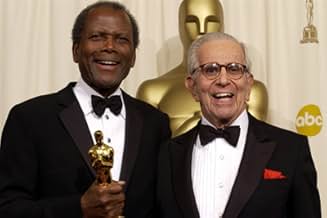Walter Mirisch(1921-2023)
- Producer
Walter Mirisch and brothers Marvin Mirisch and Harold Mirisch were one of the most
successful producing teams in Hollywood history. Their Mirisch Company
produced such diverse hits as Some Like It Hot (1959), The Magnificent Seven (1960), West Side Story (1961), The Great Escape (1963),
The Pink Panther (1963) and many others. Most of their films were financed and released
by United Artists, and through a stock swap in 1963 the brothers
acquired the company. They stayed on with UA and their production
relationships with producer/directors like Billy Wilder, Blake Edwards and John Sturges
became the model by which Hollywood makes movies today.
Starting out as a producer on such low-budget "B" fare at Monogram Pictures as Bomba: The Jungle Boy (1949), Mirisch rose to become one of Hollywood's leading industry statesman. He was a visionary who, in the declining years of the Hollywood studio system, could see that the future lay with the independent producers. Operating out of rented office space at the old Samuel Goldwyn lot in Hollywood, the Mirisches kept their overhead low by such tactics as renting studio stages and facilities only when needed. Whereas the major studios were still burdened by high overhead and salaries, the brothers were in a position to attract top talent and offer high fees and flexible control to up-and-coming directors like Norman Jewison, who responded with three hits in a row for them - The Russians Are Coming the Russians Are Coming (1966), In the Heat of the Night (1967) and The Thomas Crown Affair (1968).
Starting out as a producer on such low-budget "B" fare at Monogram Pictures as Bomba: The Jungle Boy (1949), Mirisch rose to become one of Hollywood's leading industry statesman. He was a visionary who, in the declining years of the Hollywood studio system, could see that the future lay with the independent producers. Operating out of rented office space at the old Samuel Goldwyn lot in Hollywood, the Mirisches kept their overhead low by such tactics as renting studio stages and facilities only when needed. Whereas the major studios were still burdened by high overhead and salaries, the brothers were in a position to attract top talent and offer high fees and flexible control to up-and-coming directors like Norman Jewison, who responded with three hits in a row for them - The Russians Are Coming the Russians Are Coming (1966), In the Heat of the Night (1967) and The Thomas Crown Affair (1968).




















